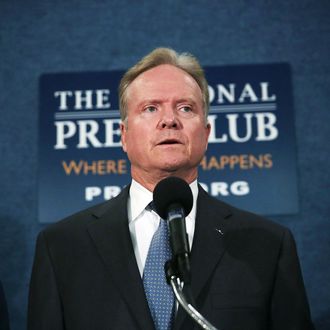
During the last half of 2015, a specter haunted the Republican “invisible primary” for the 2016 presidential nomination: an independent run for president by Donald Trump that would split the GOP base and send a Democrat gliding into the White House.
As he consolidated a position in the polls as the GOP front-runner, Trump was maneuvered into signing a party loyalty pledge (required to get onto the ballot in South Carolina), and then ruled out an indie run at and after a December candidate debate. With a guy like Trump, an abandonment of this doubled-down oath is always possible, especially if an Establishment cabal emerges to anoint, say, Marco Rubio as the designated Trump-killer. But he’s sure poured a lot of gratuitous cold water on the idea of late.
Instead, as the year ends, there’s suddenly buzz about a very different indie presidential run: one by former Democratic senator (and, briefly, 2016 presidential candidate) Jim Webb. The possibility makes some intuitive sense. Webb definitely seems to have the psychological profile of a cranky spoiler who can find fault with both parties, and even claim (as a former Reagan cabinet member and then Democratic senator) to represent both parties’ best impulses. The talk from Team Webb seems to regard Ralph Nader’s 2000 campaign as a model, which means its goal would be attention and leverage, not some remote chance of victory. Ballot access has gotten easier since 2000. And depending on what happens in the 2016 primaries, there could be a pool of disgruntled partisans that, in combination with disgruntled independents, could in theory lift a third option like Webb from nuisance to threat.
Let’s say Clinton has a harder time than is currently expected dispatching Bernie Sanders and has to rely on extra help from the DNC and other party elites in doing so. And let’s say Donald Trump’s support doesn’t just melt away, but that instead his candidacy is defeated by a vicious and massively financed negative ad campaign from a pan-GOP coalition. You could at least imagine a Webb candidacy focused on HRC’s support for military interventions and past alliances with Wall Street tapping some former Sanders and Trump voters. And if either Sanders or Trump actually wins his party’s nomination, any pre-positioned indie candidate could suddenly inherit a lot of support.
Now, either scenario for a Webb boomlet has a lot of logical gaps. Democratic voters show every sign of uniting behind either Clinton or Sanders. For all his self-projection as a tribune of downscale white folks (especially the Scots-Irish Appalachian people), Webb’s appeal to Trump’s white working-class following is entirely theoretical. Yes, he’s been warier of comprehensive immigration reform than most Democrats, but it’s hard to imagine him embracing Trump’s deport-’em-all stance or his Islamophobia. And talk aside, Jim Webb has run exactly one political race in his life, and in narrowly winning a Senate seat in Virginia in 2006, he didn’t do any better among white mountain folk than urban civil-rights lawyer Tim Kaine a year earlier — which is to say not well at all. His stubborn Confederate nostalgia has probably cost him what little chance he had to appeal to African-Americans. And given his hostility to free-trade agreements and his lack of passion for deficit reduction, Webb’s an unlikely champion for the elite “centrists” of the Simpson-Bowles variety, or for the small if legendary cadre of true independents in the electorate.
What makes a possible Webb indie run (or even a sustained threat of one) relevant is the fear it strikes in the hearts of Democrats who remember 2000 and Nader’s role in taking enough votes from Al Gore in Florida to make it possible for George W. Bush and the U.S. Supreme Court to pull off a bit of a coup. Even if he is a nonentity nationally, Webb presumably retains enough juice in Virginia to tilt that battleground state in a very close two-party race. But while some Democrats to this day believe in retrospect that Gore could have won by tilting a bit “left” and robbing Nader of a rationale for candidacy, it’s not clear at all what a Democratic nominee could do to deal with a Webb indie candidacy other than to ignore it. Emulating his eccentric positioning — to the “left,” in conventional terms, on foreign policy, and to the “right” on issues like affirmative action — just isn’t in the cards for Hillary Clinton, who seems to have decided some time ago to cozy up to Elizabeth Warren and Bernie Sanders on domestic matters while depicting herself as “tougher” and more intervention-minded than Barack Obama on foreign policy. And beyond that, there’s always the chance Webb would eventually pull more votes from Republicans disgruntled for one reason or another with their party’s nominee.
In any event, Webb, always a diffident vote-chaser, will likely give an indie race a pass. But the year-end discussion he’s spurred is a reminder that there’s no guarantee at all that the political convulsions of 2015 will give way to a placid and predictable 2016.






























